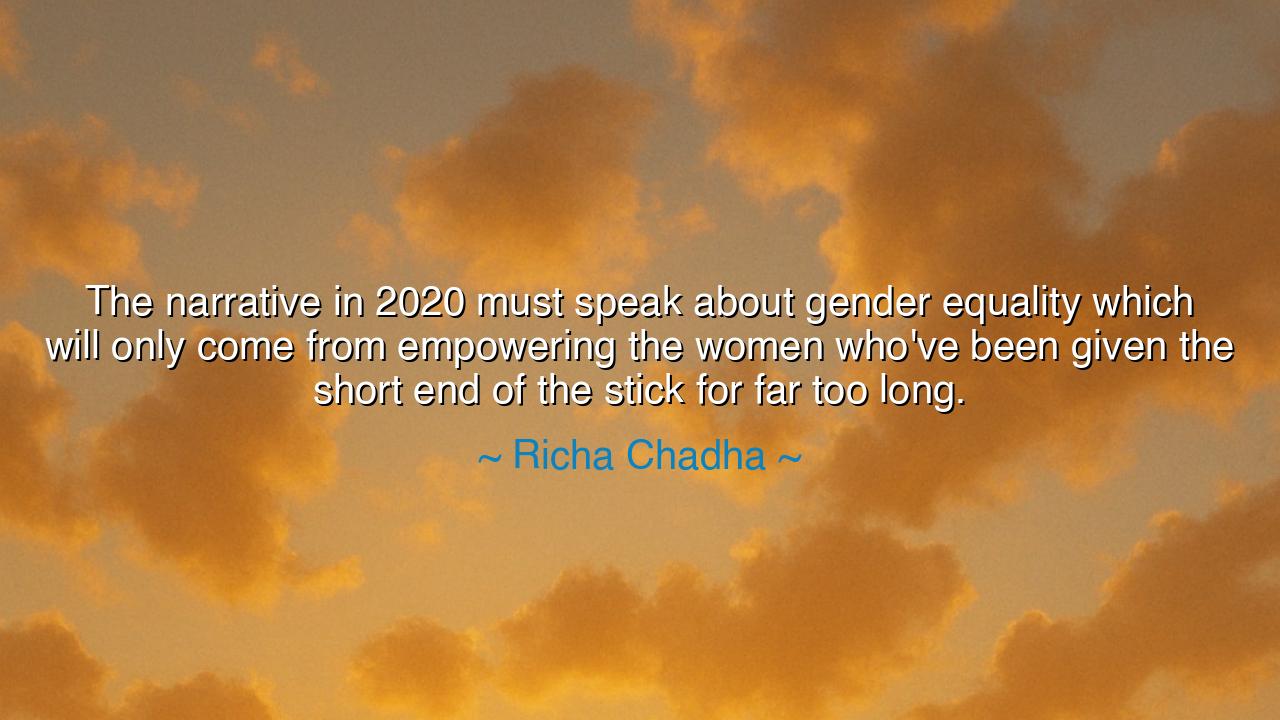
The narrative in 2020 must speak about gender equality which will
The narrative in 2020 must speak about gender equality which will only come from empowering the women who've been given the short end of the stick for far too long.






In the great unfolding of human history, the struggle for equality has often been a battle fought in the shadows, waged by those who have been denied their rightful place in the sun. Richa Chadha, in her call to action, speaks with the voice of urgency and wisdom, saying: "The narrative in 2020 must speak about gender equality, which will only come from empowering the women who've been given the short end of the stick for far too long." These words are not just a plea for change—they are a battle cry for those who have been silenced, a declaration that the time for empowerment is now.
Throughout history, the voices of women have been muffled, their contributions minimized, their rights denied. Yet, even in the face of this oppression, the strength of women has always found a way to rise. Consider the story of Joan of Arc, who, though born into a world that denied women a voice in battle, led an army to victory in the name of justice and faith. She was empowered not by the systems of her time, but by her unwavering belief that she was destined for greatness. Her story speaks to the power that lies within women, even when society seeks to suppress it. Joan's courage was not given to her—it was something she took for herself, and in doing so, she reshaped the world.
Chadha's call for a new narrative is a recognition that true gender equality cannot be achieved by merely allowing women to occupy the roles they have been given—it must be fought for by giving women the tools to build their own futures. In ancient cultures, women like Aspasia of Miletus, though often relegated to the sidelines, nevertheless found ways to influence the philosophical and political landscape of their times. Aspasia was the companion of the great Athenian leader Pericles, and though women were not expected to participate in public life, she is said to have had a significant impact on the policies and thoughts of the men who shaped the city. Aspasia’s story teaches us that empowerment begins when a woman is given the opportunity to contribute and to be heard, not just as a passive recipient, but as a active participant in shaping society.
The idea that women have been given the “short end of the stick” for far too long is a truth that stretches across the ages. From the early civilizations, where women were often treated as property, to the Victorian era, when women were denied rights to property and education, the struggle for women’s rights has been long and arduous. Yet, as Chadha suggests, this long history of oppression cannot be the final chapter. The narrative of the 21st century, especially in the year 2020 and beyond, must be one where gender equality is not just an ideal but a living reality—one that begins by empowering the women who have been denied their voice for too long.
The ancient wisdom of Hera, the queen of the gods in Greek mythology, also teaches us something crucial about empowerment. Though often portrayed as jealous and vengeful, Hera’s true power lay in her ability to lead and protect her realm. She was the goddess of marriage, women, and family, domains that were critical to the survival of the Greek world. Hera’s example shows that empowerment is not just about individual achievement, but about collective strength—the strength that women possess when they come together, support one another, and refuse to accept the constraints that have been placed upon them.
The lesson we draw from Chadha’s words is one of action and accountability. We must move beyond talk and take the necessary steps to ensure that the women of today are empowered in the ways that have been denied to them for so long. It is not enough to simply recognize inequality—we must actively work to dismantle the systems that perpetuate it. The empowerment of women is not something that can be granted—it is something that must be fought for. Just as Joan of Arc fought in the name of justice, so too must we fight for the empowerment of women, knowing that this battle is not just for the women of today, but for the generations to come.
So let us commit ourselves to the cause of gender equality—not as a distant ideal, but as a practical reality that we shape through our actions, our decisions, and our collective will. Let us give women the opportunity to rise, to speak, to lead, and to shape their own destinies. The narrative of the future must be one where empowerment is the birthright of every woman, where no one is denied their dignity, and where the chains of oppression are finally broken. In this struggle, we will not only reshape the lives of women but create a more just and equitable world for all.






AAdministratorAdministrator
Welcome, honored guests. Please leave a comment, we will respond soon